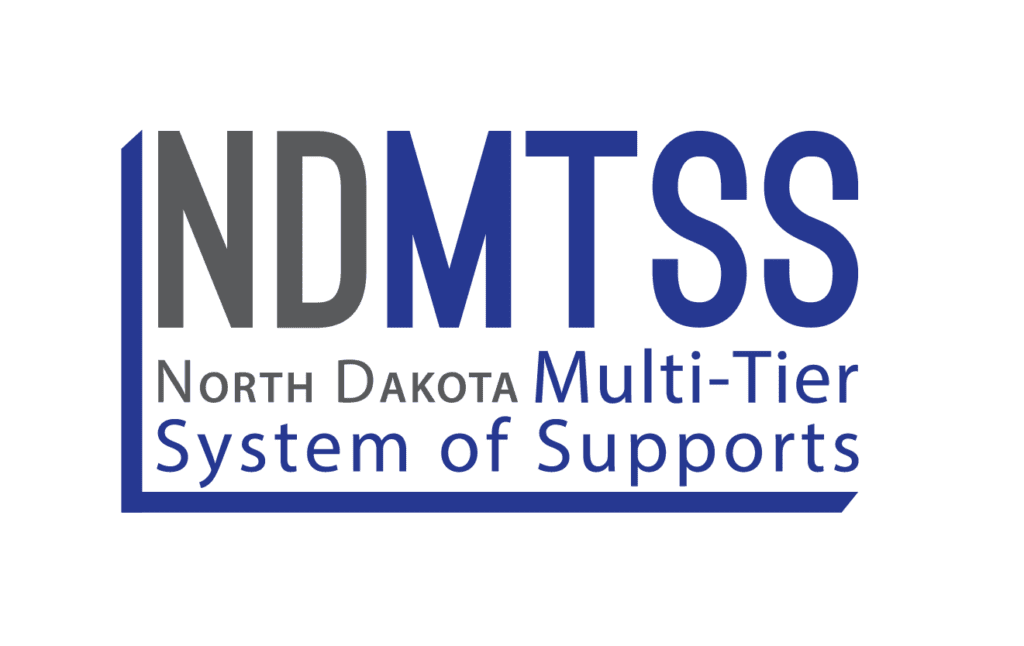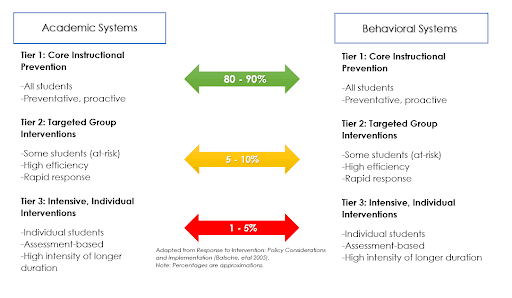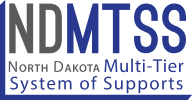Behavior Supports
Overview
“Positive Behavior Interventions and Supports (PBIS) is an evidence-based, three-tiered framework to improve and integrate all of the data, systems, and practices affecting student outcomes every day” (Center on PBIS, 2020). PBIS is not a solitary program – it is the integration of many effective strategies and programs that create a Multi-Tier System of Support (MTSS) for behavior. With an overarching emphasis on using data to determine the effectiveness of its techniques, PBIS reflects the application of explicit values and evidence-based practices to build an MTSS framework that is practical, doable, and available to all.
MTSS should not be focused on in silos – academics and behaviors should be woven together. Systems are built for students to achieve success at each tier of support. To assist in the creation of an action plan of implementation for PBIS, the Benchmarks of Quality (BoQ) are used as a baseline guide and then typically done annually.
-
Tier 1 | ALL students | 100% of students
All students receive scientific, research-based core instruction implemented with fidelity focused on school-wide behavioral expectations. Together, all stakeholders build solid foundation of expected behaviors for all staff and students to be taught and practiced for mastery. Instruction at Tier 1 should include high-quality, explicit instruction based on current student data and needs. Once the foundation has been laid at a school-level, the instruction and practice for expected behaviors begins in the classroom. Because students spend a majority of the day within the classroom setting, it is the opportune place for students to master expected outcomes. -
Tier 2 | SOME students | 10-15% of students
Universal behavioral screeners are used to identify students in need of additional layer of support. These students are provided scientific, research-based interventions in addition to core instruction according to their needs. Approximately 10-15% of students will need supplemental instruction at Tier 2 to become proficient. Tier 2 interventions are implemented with small groups of students who need support in the same skill area. Systems are then established to allow for efficient and effective implementation of the learned skills so students are able to experience success in the core. -
Tier 3 | FEW students | 5-10% of students
Tier 3 intensive interventions occur in conjunction with Tier 1 and Tier 2 support. These interventions are more individualized based on data collected in individual problem solving, typically in a one-to-one teacher to student ratio, and occur for a longer duration of time. About 5-15% of students will require this level of intensive support. The intervention's intensity, frequency and duration are considered based upon need. They also include strategies for maximizing student outcomes during core instruction (Tier 1), support provided at Tier 2, and systems are then established to allow for efficient an effective implementation of the learned skills to students are able to experience success in the core, at home and/or in the community.
Tier 1
Schoolwide
All students receive scientific, research-based core instruction implemented with fidelity focused on school-wide behavioral expectations. Together, all stakeholders build solid foundation of expected behaviors for all staff and students to be taught and practiced for mastery. Instruction at Tier 1 should include high-quality, explicit instruction based on current student data and needs. When implemented with fidelity, schools can anticipate:
- Common language for all stakeholders
- Consistency in schoolwide expectations
- Positive school climate and culture
- An increase in student achievement attendance and academic achievement
- Reduction in the need for more intensive supports
A School Leadership Team’s primary focus is to facilitate school-wide implementation of PBIS. Recommended team members include cross-disciplinary representatives including principal, general and special education teachers, student support personnel, and/or counselors. This representative group gathers ideas from other stakeholders to ensure that Tier 1 strategies will be relevant, practical, and addresses different cultural backgrounds, and reviews data to identify priorities for implementation.
To assist in the development of your individual school or district’s creation of schoolwide expectations, NDMTSS: Developing Schoolwide Behavior Expectations is offered as a year-long, multi-day series that include in-person training days and virtual coaching calls.
Benchmarks of Quality (BoQ)
PBIS Implementation Checklist (PIC)
Benefits of Tier 1 practices when implemented with fidelity:
| Students | Staff |
|---|---|
| Teaching behaviors in the setting in which they will be used | Providing time, materials, guidelines, and accountability for delivering lesson plans and student recognition by using data and stakeholder perceptions to prepare relevant lessons and recognition of staff and students |
| Providing refresher lessons for students throughout the school year so students are more likely to use them | Professional learning provided regularly to address schoolwide patterns of behavior and their responses |
| Consistency when encountering challenging behaviors, while taking child developmental norms and behavior function into account | Involvement of faculty, staff, families, and students in the development of behavior definitions and possible consequences |
| Providing praise and recognition when students meet expected behaviors | Providing praise and recognition when staff and faculty implement with fidelity |
| Family engagement on schoolwide behavior expectations, school climate, recognitions, and discipline in order to improve the effectiveness and efficiency within the system. | Staff engagement on schoolwide behavior expectations, school climate, recognitions, and discipline to improve the effectiveness and efficiency within the system. |
*Adapted from Florida PBIS Project, 2016
Classroom
“The strongest predictor of both sustained implementation and sustained improved student outcomes was implementation of classroom PBIS systems.”
McIntosh et al., 2017
Recent research shows that classroom PBIS systems play a critical role in achieving positive student outcomes (Childs, Kincaid, George, & Gage, 2016). However, the fidelity of classroom PBIS practices can be difficult to sustain, with some research suggesting that fidelity may start to decline within a few days of implementation (Nelson, Oliver, Hebert, & Bohaty, 2015). As a result, schools are encouraged to engage in regular assessment and on-site coaching of critical classroom management practices.
Five Essential Classroom Practices:
-
Maximize Structure
Create predictable routines in a safe and orderly environment. -
Behavior Expectations and Rules
Teach, monitor and reinforce schoolwide expectations and rules. -
Student Engagement
Actively engage students by providing contextually relevant instruction with a multitude of opportunities to respond with a variety of response modes.
-
Acknowledging Appropriate Behavior
Use of a continuum of cultural and contextually relevant strategies to acknowledge expected behaviors. -
Responding to Inappropriate Behavior
Use a continuum of cultural and contextually relevant strategies to respond to inappropriate behaviors.
Tier 2
Tier 2 supports build on the lessons provided at Tier 1 and may prevent the need for more intensive interventions. Tier 2 supports are provided to small groups of students with similar needs, (e.g., social skills, study strategies, friendship skills) and offer more time and/or explicit instruction on the core curriculum. The types of interventions offered at this level will vary according to school-level data and student need, but all have certain things in common:
- There is a clear connection between the skills taught in Tier 2 interventions and the school-wide expectations. This helps students and staff apply those lessons in non-intervention settings.
- Tier 2 interventions require little time from classroom teachers and are easy to sustain.
- The interventions are evidence-based and are matched to student needs.
Tier 3
Tier 3 systems build upon Tiers 1 and 2 and provide an additional layer of support for students in both general and special education who need more individualized interventions to achieve positive outcomes. This may involve conducting Functional Behavior Assessments (FBA) and developing Behavior Intervention Plans (BIP).
The U.S. Department of Education recently released new guidance around FBA’s and BIP’s:
Using Functional Behavioral Assessments to Create Supportive Learning Environments
Summary by Behavior Advantage
Purpose and Context
The document above underscores the importance of Functional Behavioral Assessments (FBAs) and Behavioral Intervention Plans (BIPs) in fostering safe, inclusive, and supportive learning environments for all students, not just those with disabilities. It calls for schools to shift from exclusionary discipline practices to evidence-based, proactive approaches.
Key Points
- FBAs for All Students:
- Traditionally used for students with disabilities, FBAs are now recommended for any student whose behavior interferes with learning, addressing both externalizing (e.g., aggression) and internalizing (e.g., withdrawal) behaviors.
- FBAs help educators understand the function of behavior and develop targeted strategies to address its underlying causes.
- Note from Behavior Advantage: FBAs don’t always need to be complicated processes. There is room for both informal and very practical function-based behavior plan models!
- Impact of Exclusionary Discipline:
- Suspension, expulsion, and informal removals disproportionately affect students from marginalized groups, including Black students, students with disabilities, and boys.
- Exclusionary practices contribute to academic disengagement, dropout rates, and the school-to-prison pipeline.
- Guiding Principles for Effective FBAs and BIPs:
- Clear, specific, measurable, and culturally responsive descriptions of behaviors.
- Use of data collection and analysis to identify antecedents, behaviors, and consequences.
- Collaborative development involving educators, specialists, families, and students.
- Focus on skill development to replace interfering behaviors with positive alternatives.
- Regular monitoring and evaluation of the effectiveness of interventions.
Note from Behavior Advantage: Behavior Advantage provides tools and features to meet ALL of these guiding principles in both an effective and efficient manner!
- Incorporation into Multi-Tiered Systems of Support (MTSS):
- FBAs and BIPs can be integrated into MTSS frameworks at all tiers:
- Tier 1: Universal strategies for all students.
- Tier 2: Targeted interventions for groups of students with similar needs.
- Tier 3: Intensive, individualized support for students with chronic or severe behaviors.
- FBAs and BIPs can be integrated into MTSS frameworks at all tiers:
- Collaborative Efforts:
- Emphasizes the value of partnerships among educators, parents, and students during the FBA and BIP process.
- Highlights the importance of cultural and contextual relevance to ensure interventions are effective and equitable.
- Support for Students with Disabilities:
- FBAs are essential for developing Individualized Education Programs (IEPs) and meeting the Individuals with Disabilities Education Act (IDEA) requirements.
- They can be used to inform behavioral goals, identify necessary supports, and ensure access to free appropriate public education (FAPE).
- Best Practices for Implementation:
- Use a function-based approach to align behavioral supports with students’ needs.
- Address implicit bias in the interpretation of behaviors.
- Provide professional development for educators to ensure fidelity in implementation.
- Federal Funding:
- FBAs and BIPs can be supported through federal funding sources, including IDEA, ESEA Titles I, II, and IV, and grants under the Bipartisan Safer Communities Act.
- Outcomes of Proactive Approaches:
- Improved academic engagement and social-emotional development.
- Reduced reliance on exclusionary discipline.
- Enhanced school climate and student well-being.
Call to Action
The U.S. Department of Education urges schools to adopt FBAs and BIPs as routine practices to better support student behavior, improve inclusivity, and promote positive educational outcomes. By leveraging these tools within a schoolwide framework, educators can transform disciplinary approaches into opportunities for growth and engagement.


